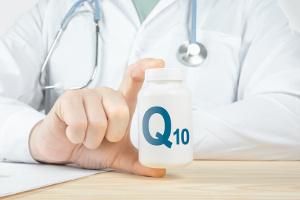Statin users have a lower risk of developing diabetes if they take Q10 supplements
 The widespread use of cholesterol-lowering statins increases the risk of developing diabetes, which is linked to cardiovascular disease. It has also been shown that statins inhibit the body’s endogenous synthesis of Q10, which plays a role in cellular energy metabolism and is also a vital antioxidant that protects cells and the cardiovascular system. A new American population study shows that statin users can reduce their risk of developing diabetes by taking a Q10 supplement.
The widespread use of cholesterol-lowering statins increases the risk of developing diabetes, which is linked to cardiovascular disease. It has also been shown that statins inhibit the body’s endogenous synthesis of Q10, which plays a role in cellular energy metabolism and is also a vital antioxidant that protects cells and the cardiovascular system. A new American population study shows that statin users can reduce their risk of developing diabetes by taking a Q10 supplement.
Cardiovascular diseases remain the leading global cause of reduced quality of life and early death. As elevated cholesterol is believed to contribute to atherosclerosis, statins are now among the most commonly used drugs. Statins work by inhibiting an enzyme (HMG-CoA reductase) that the body uses to produce cholesterol. However, since cholesterol is also a prerequisite for the formation of Q10 and several other essential substances, statins interfere with these processes, as well. In addition, the body’s endogenous Q10 synthesis declines with age, making statin users more prone to a deficiency of this vital substance.
Several meta-analyses have revealed that statin users have an increased risk of developing “new-onset diabetes” (NOD), which counteracts the beneficial effects of statins. This is because diabetes, at the molecular level, is associated with chronic inflammation, oxidative stress, and a disrupted lipid profile - all of which increase the risk of cardiovascular disease. Since a lack of Q10 is believed to be a contributing factor in the development of diabetes, the researchers behind the new study set out to examine this further.
The new study included 4,394 statin users recruited from a larger American population study called NHANES (National Health and Nutrition Examination Survey). The participants’ average age was 62 years, and data on their lifestyle, supplement use, and health status was collected from 1999 to 2018. The researchers compared the incidence of new-onset diabetes among those who took Q10 supplements and those who did not. Two models were used to eliminate confounding factors such as age, gender, race, BMI, blood pressure, smoking, and alcohol consumption.
The study revealed that the statin-using participants who took Q10 supplements had a statistically significant lower risk of developing diabetes. This difference remained even after adjusting for confounding factors.
In the study, which is published in Reviews in Cardiovascular Medicine, the authors elaborate on the importance of maintaining adequate Q10 levels.
Q10’s importance for energy metabolism, circulation, and blood sugar levels
As mentioned, we produce Q10 from cholesterol in a process that also requires an amino acid called tyrosine. Q10 exists in two forms that reversibly interconvert as needed with the help of selenium. One form, ubiquinone, is crucial for cellular energy metabolism and the production of ATP in the mitochondria. The other form, ubiquinol, acts as a powerful antioxidant, protecting cholesterol, cell membranes, and mitochondria from damage caused by free radicals and oxidative stress. We all generate free radicals during energy metabolism and other metabolic processes. This impact is further increased by aging, overweight, toxins, chronic diseases such as diabetes, and as a side effect of various medications. These factors heighten the risk of oxidative stress, where harmful free radicals outweigh the body’s antioxidant defenses.
In the blood, Q10 appears as the important antioxidant ubiquinone, which is transported by the much-criticized LDL cholesterol, while also protecting the LDL cholesterol from oxidative stress. It is worth noting that low LDL cholesterol can reduce the blood’s Q10 levels and make LDL cholesterol more vulnerable to oxidative damage.
A Q10 deficiency can also lead to oxidative stress in the mitochondria, which can damage the pancreatic beta cells, causing them to undergo programmed cell death – also known as apoptosis. This can impair insulin sensitivity, thereby reducing the cells’ ability to absorb blood sugar. Over time, increased insulin resistance raises the risk of developing diabetes.
Previous studies of mice have shown that Q10 supplementation reduces the risk of developing diabetes. This new study has now demonstrated that Q10 supplements also reduce the risk of diabetes in statin users.
Pharmaceutical-grade Q10 supplements
When the body produces Q10 naturally, it is in a fat-soluble free form that is easily absorbed. However, in raw materials used for supplements, Q10 molecules tend to aggregate in large crystals that are unable to dissolve at normal body temperature and are therefore difficult to digest. To get the full benefit from a Q10 supplement, the raw material must first undergo a special oil and heat treatment that dissolves the crystals completely, separating the individual Q10 molecules so they can pass through the intestinal membrane. For this reason, leading Q10 researchers recommend pharmaceutical-grade Q10 supplements with documented high bioavailability.
It is generally recommended for statin users to take 100 mg of Q10 daily to reduce various side effects, including diabetes, muscle pain, and fatigue.
Reference:
Xiaorong Han et al. Diabetes Risks of Statin Therapy-Coenzyme Q10 may Help. Reviews in Cardiovascular Medicine. 2025 Feb.
TIP! See also the related articles
Search for more information...
- Created on .








